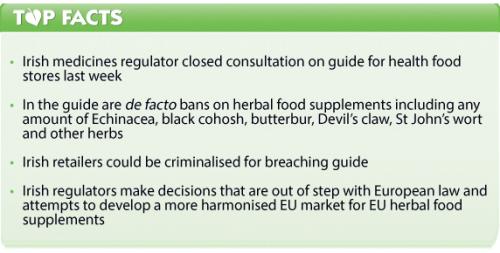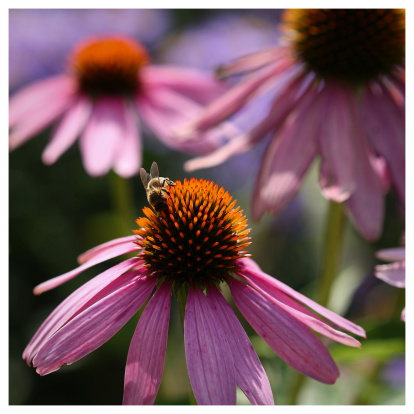Last week, the Irish medicines regulator, the Health Products Regulatory Agency (HPRA), formerly the Irish Medicines Board, closed its consultation on its proposed guide to help retailers decide on what herbal products they should and shouldn’t sell. First, up Irish retailers have told the HPRA they find the guidance excessively complex and unworkable.
But that's not all. Hidden inside the draft guide is something much more sinister. It’s a de facto plan to ban outright all food supplements selling in Ireland that contain the herbs Echinacea, black cohosh, St John’s wort, butterbur, Devil’s claw, globe artichoke leaf, goldenseal, greater periwinkle (Vinca major), lesser periwinkle (Vinca minor), Griffonia – and of course, the Irish authority’s long-time favourite herbal medicine (only), ginkgo biloba.

We say that guidance that tells retailers they cannot sell these herbs as food supplements is utterly inconsistent with European Union case law. That’s because the proposed guide restricts the sale of these herbs as food supplements at any dose, in any formulation, regardless of amount. European case law has made very clear that it’s the dose that matters (stupid!). This means that medicinal determinations by a member state regulator like the HPRA should be made on a case by case basis, taking into account things like the amount of active ingredient(s), claims, posology, etc.
Interestingly, this is the approach the HPRA has taken with a number of other herbs, such as Boswellia serrata (Indian frankincense), cat’s claw, hawthorn and horsetail (aerial parts). Why it’s done this with Boswellia is anyone’s guess, when there’s a 2009 judgment (Case C-27-08) in the European Court that recognises 400 mg of extract as a food supplement after the German authority tried to classify it as a medicine.
There’s one piece of good news, though, and we can’t help letting you know that this is something we’ve been very proactive about with the Irish and other authorities for some time. That relates to the HPRA deciding that milk thistle with a daily dose of silymarin beneath 200 mg should be regarded as a food supplement. That’s entirely sensible, or at least makes a mockery of the fact that some regulators are trying to hold out with no justifiable legal basis that the dose of an active in a food supplement should not exceed that in a registered medicine, including a herbal medicine. In the case of milk thistle, silymarin levels for medicines go down to as low as 50 mg/day, which is not going to be very helpful to anyone wanting any proper liver support (200-600 mg silymarin a day is more like it).
Covert ban hidden in over-complicated clothes
The proposed name for the guide perhaps gives away the Irish authority’s mission. The HPRA is proposing to call its guidance “The Guide for Retail Sale of Herbal Medicinal Products”. Interesting, isn't it, that food supplement shouldn't appear in the title? One purpose of the guide is to make sure that the only herbal medicines that are sold by health stores in Ireland are ones that are registered under the somewhat broken ‘traditional herbal medicines’ regulatory scheme. You’ll remember that’s the one that has barely registered a single, genuine traditional herbal medicine of Western and especially Eastern heritage. Most traditional formulations are excluded by virtue of the fact they don’t fit with the pharmaceutical stability standards borrowed from contemporary drug licensing. But there are many other challenges to eligibility, as well as high costs which simply don’t suit a large and diverse range of relatively low volume products.
The other key element of the HPRA mission relates to guidance about which botanical containing food supplements Irish retailers can and can't sell. Put simply they can't sell anything unless it's a licensed medicine or 'clearly' a food or food supplement. The HPRA's guide of course tells retailers that many products containing particular herbs are now medicines, while others might be medicines.
The HPRA asked that the responders to the consultation limit their comments to ones “relevant to improving its comprehension and use only.” That means if you don’t like any of the decisions made, such as not liking the fact that it 'inadvertently' bans herbs that you’ve been selling safely for years, to people who really rely on them to maintain their health, you can say nothing.
Founded in 1986 and representing the majority of independently owned health stores in the Republic of Ireland, the Irish Association of Health Stores (IAHS) says that the latest lists produced by the HPRA as part of the proposed Guidance prove almost unworkable for the average retailer. "The feedback we have had from our members in relation to this Guide is that the level of complexity attached to it makes its application in the workplace almost impossible", said IAHS president Jill Bell. She added, "One would have hoped that a simpler and more workable Guide which would have aided retailer compliance would not have been beyond the HPRA's capabilities."
Worse still, the HPRA is asking retailers to agree to it. You can imagine how this could play out when a retailer is found selling a herb that doesn't fit with the guide’s decision tree. A zealous regulator might then pronounce: “You had your chance to comment on the guide, you did so, and now you are disregarding it. Sorry, but you have knowingly broken the law and will now be made a criminal.”
Consultation input
Apart from the IAHS's own comments, Rob Verkerk, as scientific advisor to the IAHS, independently many his concerns known to the HPRA via its consultation process. We believe that the HPRA's approach, as a national medicines regulator in the EU, is out of order. This is especially the case given the medicines regulator has no legal competence over foods or food supplements.
In addition, any member state regulator should abide by European case law and take note of other initiatives that are trying to provide a rational, yet liberal, single market for botanical food supplements EU-wide, that allows consumers freedom of choice. Relevant other initiatives include the EU-funded PlantLIBRA project and the BELFRIT list that brings together the views of the Belgian, French and Italian regulators in this area.
Momentum behind BELFRIT is increasing, with Romania and Netherlands coming on board – and it seems that the Irish, as well as the UK, Germany and the Nordic countries are increasingly out of step. A herbal divide is in the making and it is just a matter of time before the European Court will need to be brought in to intervene.
We will update you again once the results of the Irish consultation are revealed. It may be necessary at that point to call on Irish consumers to help Irish retailers, along with the IAHS, in their mission to maintain diverse natural health product choice, for your benefit.








Comments
your voice counts
05 February 2015 at 11:36 am
I am one of the vastly growing numbers of people that relies on herbs; there is no medical treatment for my condition. The thought that I may not be able to get the herbs I need and I'm too ill to grow my own in my garden frightens me a great deal!
22 February 2015 at 5:46 pm
I wonder if this has anything to do with Irelands economic reliance on all the Pharmaceutical companies that are now based here. !!!!!!!!!!!!
Ps It makes me furious, that my choice of healthcare for me and my family is compromised yet again.
So much for Democracy.
12 May 2015 at 12:48 am
Can anyone tell me if this applies to importing one of the named herbs (butterbur) from a country that doesn't ban it, such as U.S.A? Apparently I can purchase butterbur from a vitamin company that will ship it to Ireland but I don't want to do anything illegal or have it stopped at customs. I'm really desperate to try this for my constant congestion without having to resort to medication that will give me "rebound congestion" for the rest of my life!
15 May 2015 at 5:04 pm
Butterbur is considered as medicinal for oral use in Ireland, based on the HPRA’s Retailer List C. However, you should recognise that this list does not have legal weight, and in fact the European Court of Justice (the supreme legal body in the EU) has shown via the case law that a herb cannot be viewed as medicinal per se, without taking into account all of its characteristics as a herbal products, including dose, intended use, claims etc.
Most certainly, you can import for personal use from outside of Ireland, including other EU member states that sell it (e.g. Swanson Butterbur Extract 75 mg - 120 Capsules - 15% Petasins), or outside the EU, e.g. the USA. That is because the sale has been made outside of Ireland.
Hope this helps
18 August 2016 at 2:15 pm
I do not like the ban because I would like to buy ginkgo biloba in a shop and in accordance with the law. Who would I need to speak to to make this happen?
10 November 2016 at 8:23 am
I bought it on line - the 'Certified Extract' 120mg version. No problem.
I don't want to name the company but they have a European site.
Should be easy to figure out with the help of Google.
However beware of sub standard products.
19 November 2016 at 11:58 pm
Why have they banned also 5-HTP and Cina?
12 March 2017 at 12:04 am
The should ban SUGAR!
Your voice counts
We welcome your comments and are very interested in your point of view, but we ask that you keep them relevant to the article, that they be civil and without commercial links. All comments are moderated prior to being published. We reserve the right to edit or not publish comments that we consider abusive or offensive.
There is extra content here from a third party provider. You will be unable to see this content unless you agree to allow Content Cookies. Cookie Preferences